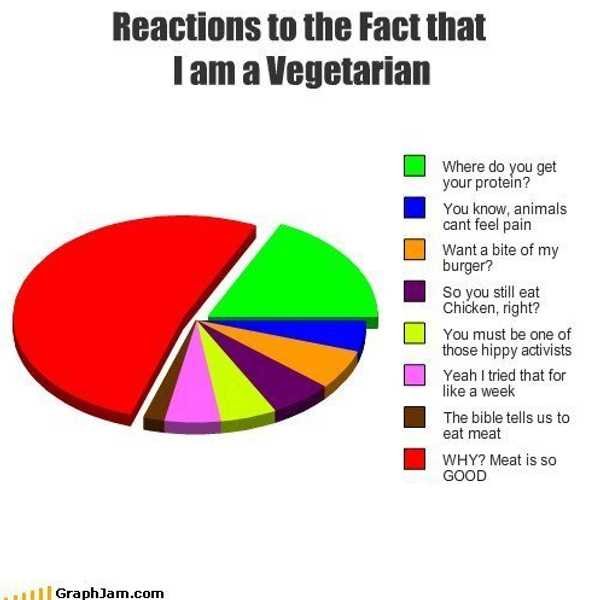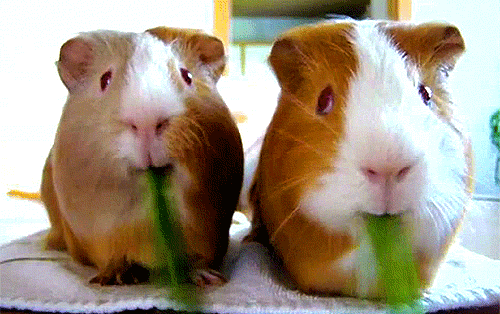A note to readers: This article in entirely comprised of my opinion as a vegetarian and the opinions of my vegetarian friends. You are more than welcome to disagree and, if you do, feel free to say so in the comments! I am merely speaking on behalf of myself, not on behalf of the vegetarian community as a whole. I have also listed a number of references and resources below because, for all you know, I could be making all of this up.
When someone says, “I’m a vegetarian,” the surrounding meat-eaters cringe and prepare themselves for the onslaught of judgment and questions. The reality is, most vegetarians do the same thing. As a vegetarian, I am always primed to defend my diet, as are the omnivores around me.
Here are a few of the vegetarian stereotypes (assessed for validity) that I have encountered:
Stereotype: We hate meat-eaters.
Verdict: FALSE
Most vegetarians don’t give a damn that you’re eating a cheeseburger in our vicinity. In fact, we probably think it smells good. Like, really good. Just like you, we love that we have a choice about what goes into our bodies. We recognize that being a vegetarian is a privilege and know that many factors can make it challenging for everyone to follow vegetarian diets. Though we may believe a vegetarian diet is better for us, we recognize that it’s not for everyone.
Stereotype: We miss eating meat.
Verdict: DEPENDS
In moments of extreme hunger, close proximity to chicken strips or summer barbecues, we sometimes have moments of “Wait…why am I a vegetarian again?” Though this can happen, we quickly remind ourselves of the reasons that we follow a vegetarian diet, whatever these may be. Sometimes we eat meat and return to the vegetarian diet after, and this doesn’t make us any less valid. And then there are times when we accidentally eat meat or are tricked into eating meat, only to ask ourselves later why that Thanksgiving stuffing was so freaking delicious (answer: sausage).
Stereotype: We get defensive.
Verdict: TRUE
Just as you would likely want to eat your cheeseburger in peace, we too want to order tofu without being bombarded with questions about our vegetarian diet. Most of the time, we’re just doing what we think is right for us at that time. We recognize that you are doing the same. Please don’t ask us to “just try one piece of bacon” because “animals taste good.” We know this, thank you.
Stereotype: We are hippies.
Verdict: DEPENDS
Well, okay, I did go through a phase of making my own deodorant, brewing kombucha in my living room and washing my body with exclusively raw honey. But, most of the time, I enjoy the modern luxuries of life including gas-powered vehicles, wifi, air-conditioning and mixed-fiber clothing. That being said, I do follow a vegetarian diet for environmental reasons, though I would not identify as a hippie, nor am I really sure that there is a definition. Bottom line: we’re pretty “normal” people.
Stereotype: We’re vegetarians because we think animals are cute.
Verdict: DEPENDS
Yes, I originally became a vegetarian for animal welfare reasons. Years later, my vegetarianism is primarily based on the environmental impact of meat and its contribution to climate change (if you’d like to know more about this, see the resources listed below). With this in mind, people are vegetarians for a wide range of reasons, all of which are equally valid. Some people are vegetarians for health benefits, religious reasons, animal welfare concerns, limited access to sustainably sourced meat, and more.
Stereotype: We are protein deficient and always hungry.
Verdict: FALSE
Most vegetarians have an increased awareness of a balanced, protein-rich diet for this reason. More often than not, vegetarians are able to meet their protein needs from plants alone. Common sources are things like beans, nuts, chickpeas, eggs, grains and dairy. Meanwhile, animal protein can be high in saturated fat and cholesterol, which can increase risks for heart disease, cancer, and diabetes.
Stereotype: Vegetarianism is all or nothing.
Verdict: FALSE
With meat consumption in the US at an all-time high (57 lbs per person per year above 1950s levels), many people choose to eliminate meat from their diet altogether in an attempt to offset these impacts (USDA). That being said, committing to a vegetarian diet can seem daunting or extreme for most people. An increasing number of people recognize that eliminating meat consumption altogether is not the only option. Movements toward the “flexetarian” diet and “Meatless Mondays” encourage limited meat intake without cutting out the indulgence of cheeseburgers, chicken nuggets and steaks altogether. If you’d like to know more about the impact of meat consumption on the environment and how you are able to participate, there are endless resources available, a few of which I’ve included below.






















